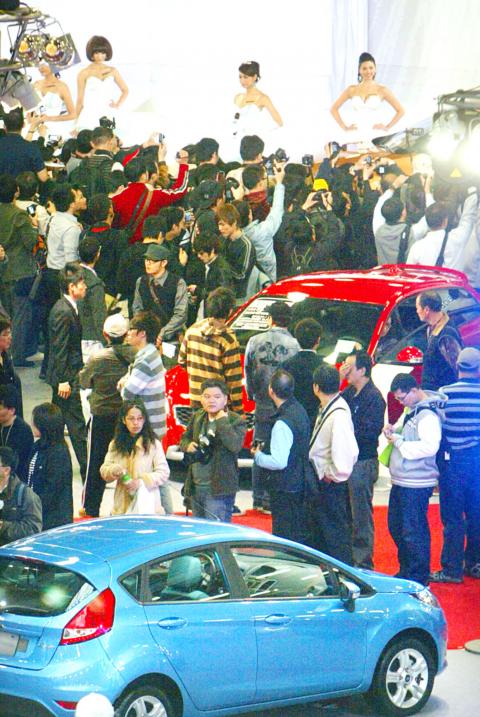Luxgen Motor Co (納智捷汽車), a subsidiary of the nation’s largest automaker, Yulon Motor Co (裕隆汽車), said yesterday that it would work to expand its markets in the Middle East and make inroads into Russia next year.
Luxgen, which was launched in January last year, has recently signed agreements with dealers in Oman, Bahrain, Vietnam, Qatar and the Dominican Republic.
The company entered these markets after participating in car exhibitions that eventually led to partnerships between the company and its dealers in these countries, Luxgen senior vice president Vincent Tsao (曹中庸) told reporters at the Taipei Automobile Show.

PHOTO: CNA
“We plan to expand our market scope in the Middle East to cover Saudi Arabia, Iran and other countries,” he said.
The automaker will take part in an auto exhibition in Dubai next year, he said.
With an eye on entering the Russian market next year, the company is also considering participating in an auto show in Russia in the second half of next year, he added.
On the question of how it plans to market its vehicles to foreign consumers, Tsao said that Luxgen’s advantage is its incorporation of Taiwan’s information and energy technologies into its vehicles’ electronic systems.
He added that Luxgen’s current marketing strategy is focused on branding rather than quantity.
Luxgen made its first overseas shipment on Dec. 20, sending 100 vehicles to the Dominican Republic. The company has forecast that its overseas shipments will exceed 1,000 units next year.
For the Chinese market, a joint venture formed by Yulon and China’s Dongfeng Motor Corp (東風汽車) is planning to ship luxury Luxgen models next year, Tsao said.

TARIFFS: The global ‘panic atmosphere remains strong,’ and foreign investors have continued to sell their holdings since the start of the year, the Ministry of Finance said The government yesterday authorized the activation of its NT$500 billion (US$15.15 billion) National Stabilization Fund (NSF) to prop up the local stock market after two days of sharp falls in reaction to US President Donald Trump’s new import tariffs. The Ministry of Finance said in a statement after the market close that the steering committee of the fund had been given the go-ahead to intervene in the market to bolster Taiwanese shares in a time of crisis. The fund has been authorized to use its assets “to carry out market stabilization tasks as appropriate to maintain the stability of Taiwan’s

STEEP DECLINE: Yesterday’s drop was the third-steepest in its history, the steepest being Monday’s drop in the wake of the tariff announcement on Wednesday last week Taiwanese stocks continued their heavy sell-off yesterday, as concerns over US tariffs and unwinding of leveraged bets weighed on the market. The benchmark TAIEX plunged 1,068.19 points, or 5.79 percent, to 17,391.76, notching the biggest drop among Asian peers as it hit a 15-month low. The decline came even after the government on late Tuesday authorized the NT$500 billion (US$15.2 billion) National Stabilization Fund (國安基金) to step in to buoy the market amid investors’ worries over tariffs imposed by US President Donald Trump. Yesterday’s decline was the third-steepest in its history, trailing only the declines of 2,065.87 points on Monday and

TARIFF CONCERNS: The chipmaker cited global uncertainty from US tariffs and a weakening economic outlook, but said its Singapore expansion remains on track Vanguard International Semiconductor Corp (世界先進), a foundry service provider specializing in producing power management and display driver chips, yesterday withdrew its full-year revenue projection of moderate growth for this year, as escalating US tariff tensions raised uncertainty and concern about a potential economic recession. The Hsinchu-based chipmaker in February said revenues this year would grow mildly from last year based on improving supply chain inventory levels and market demand. At the time, it also anticipated gradual quarter revenue growth. However, the US’ sweeping tariff policy has upended the industry’s supply chains and weakened economic prospects for the world economy, it said. “Now

An employment discrimination lawsuit against contract chipmaker Taiwan Semiconductor Manufacturing Co (TSMC, 台積電) might soon be expanded after a hearing in a federal court in San Jose, California, on Tuesday to add 15 plaintiffs to the case. According to a court document, the lawsuit, which was refiled in November last year as a form of a class action with 13 plaintiffs in California, wants to add 15 plaintiffs from Arizona, where TSMC is building up its wafer fab capacity. TSMC first committed between 2020 and last year to invest US$65 billion in three advanced wafer fabs in Arizona. It then pledged an